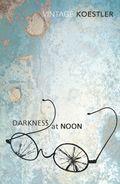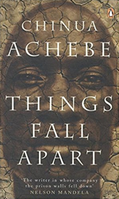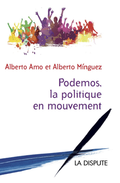Since I have recently worried more than on average (this is a constant preoccupation) on political turmoil, oppression and dictatorship, etc., in the wake of the American political landscape, brexit, and, of course, the French elections, I have put back at the top of my list some old-time classics that I have wanted to read for a long time, plus a political essay/documentary from someone I personally know.
-
Darkness at noon.
-
Things fall apart.
-
Podemos, la politique en mouvement.
The intent is to get from the wisdom of important authors some more balanced, deep and appeased onlook into universal and timeless problems of excruciating actualities, along with more contemporary viewpoints, that one dangerously only gets, otherwise, from mass medias.
Literature is a good place to go. Even, if not particularly, the literature of important but not first-rate authors. I believe, for instance, that these are authors like Bernanos or Gheorghiu who best captured the essence and nature of the main challenges for our modern society. Read Bernanos, for instance:
- Je pense depuis longtemps déjà que si un jour les methodes de destruction de plus en plus efficaces finissent par rayer notre espèce de la planète, ce ne sera pas la cruauté qui sera la cause de notre extinction, et moins encore, bien entendu,l'indignation qu'éveille la cruauté, ni même les représailles de la vengeance qu'elle s'attire... mais la docilité, l'absence de responsabilité de l'homme moderne, son acceptation vile et servile du moindre décret public. Les horreurs auxquelles nous avons assisté, les horreurs encore plus abominables auxquelles nous allons maintenant assister ne signalent pas que les rebelles, les insubordonnés, les réfractaires sont de plus en plus nombreux dans le monde, mais plutôt qu'il y a de plus en plus d'hommes obéissants et dociles.
If you read French, and also read my blogs, or discuss with me on these questions, then you can see how this matches with my most pressing anxieties and worries for our future, for our society of political correctness where one has to agree and comply in its Manichean understanding of the world.
Since I am also under the prolonged impression that times ahead will be troubled ones, with impending wars of some sort, conventional or of a new type, I feel that it is important to reflect on its most adverse and abominable aspects, which appear to be universal and timeless: brutality, sufferings, violence, abuse of power, etc. I want to read from different authors and different settings about these constant of humanities. Hence the two first titles.
The last title is motivated by two reasons. First, because it relates to the Spanish and European political situation, of which I have no strong personal opinion for lack of personal knowledge on this topic. While I tend to be a bit wary of the Podemos movement (its counterpart in Greece has been a great disappointment and its counterpart in French is also cause for concerns), it seems true that the Madrid branch in particular, and apparently also the Barcelona branch, have some of the virtues of the Commune de Paris, with actual successes following an honest and sincere political route. My Spanish acquaintances, including family, are also positively disposed when not outright supportive or even members of Podemos, hence my interest. Second, because I know personally one of the authors, Alberto Amo, who is also a co-author of mine in the scientific literature. I had the occasion and pleasure to discuss with him a few days ago, in Daejeon in Korea, on such questions, following the election of Macron, of which we both disapprove, although we fail to agree on many issues. Alberto is willing to shape the future, and I hope he'll succeed. Bernanos also wrote "L'espérance est un risque à courir" (?!), a citation truncated by Macron himself in one of his campaign speeches, which is not however the most outrageous (for someone who feels that there is no French culture, quoting Bernanos is bound to be out of context). While Alberto told me the book is already obsolete in his thinking of what the situation is and should be, one would not expect anything else from someone deeply involved in the most recent developments and planning their future evolution. Still I'm looking to take advantage of reading it to develop and express an opinion about it.
In my previous reading lists, the latest being themed on the Plaza Mayor, I was mainly listing the books I was about to read, sometimes with a few comments on to the motivation but, obviously, little background on the material itself as I had not actually read the books already. I wonder if this is the best way to go... In a few occasions, I don't get to read the book (by lack of time), but more importantly, this does not encourage me to find the time to actually comment on the books themselves after reading them. Instead, it brings me to another reading list. That would be maybe more useful, to make a "recently read list" as well or instead. For lacking the latter, I have said nothing about such titles as Burmese Days, A Clockwork Orange, Of mice and men or One month in the country, that are my most recent reads. While I would not particularly want to say much on the latter [1], there are still observations I would have liked to keep written somewhere, if only for my own sake. I liked for instance Carr's observation regarding factual mistakes in the names of the characters, due to the fact that he can only proofread a book when it has been published already. I suffer from the same problem, for instance, I often read an email I just sent, which is stupid as I often find it in needs of corrections. I also was surprised to see that there also was a movie version [2]. The story also has some connections with a novel that Elena's father wants or wanted to write (on the discovery of a romanic statue). I would probably touch upon what it says on the British people as read by a French reader.
Anyway, while this particular title has little for me to say about it, the others are great classics of considerable importance, to which I would like to comment as they are endless sources of material (not of mice and men, though), thinking I'll eventually do that without the need of a blog's reading list or a variation of it to cover the "just read" titles, which is probably a mistake. I'll try to make not only lists to reads in the future but also "of read and liked" books.
⇠ See also the previous reading list.
⇢ See also the next reading list.


